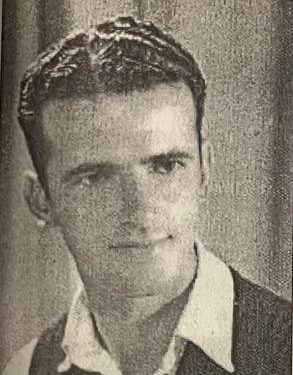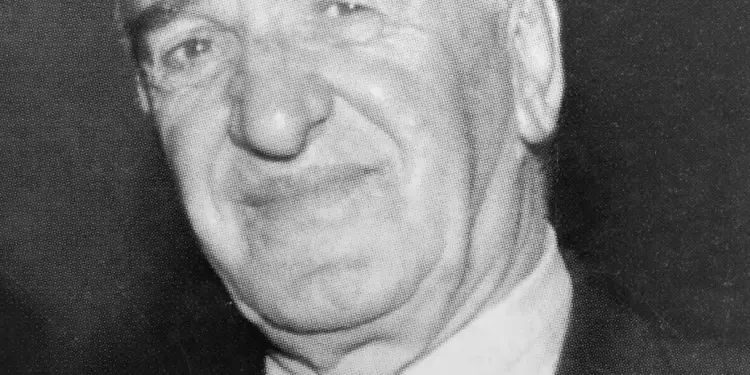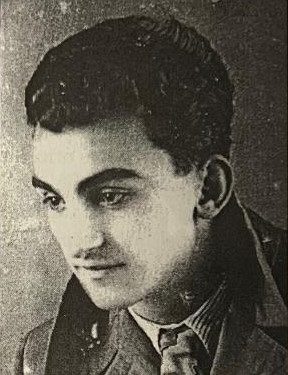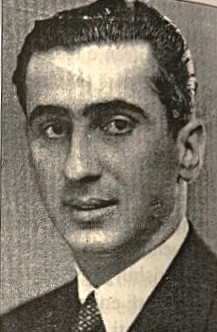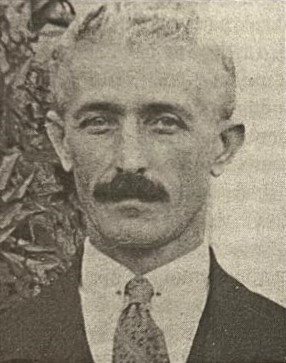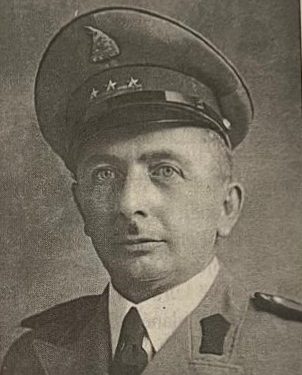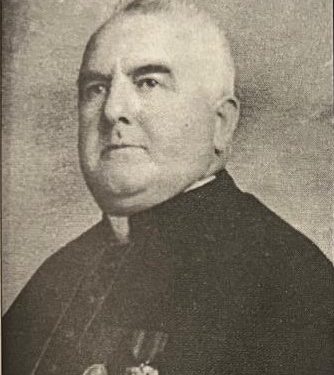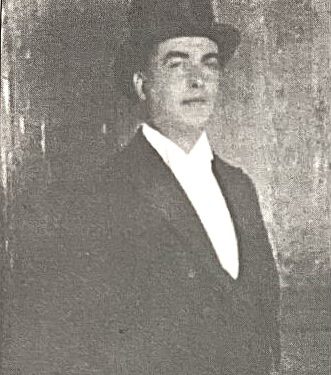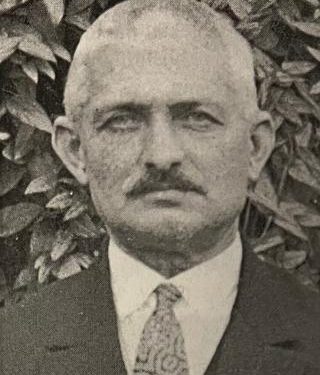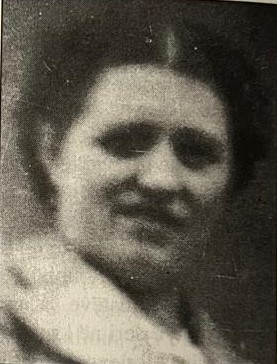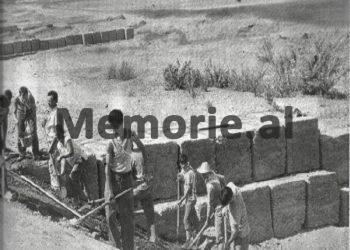By Ahmet Bushati
Part seventeen
Memorie.al/After the flag was altered in 1944 with the addition of the communist star, Shkodra transformed into a center of resistance against the regime, paying a high price for its tradition of freedom. By April 1945, high school students, already feeling betrayed by the promises of the war, gathered to oppose the new terror that imprisoned and killed innocent people. Communism turned Kosovo into a province of Yugoslavia, while Shkodra was punished for its “historical crime”- its defiance against invaders. The “Postriba Movement” became a tool to suppress all dissent, plunging the city into an unprecedented spiral of suffering: imprisonments, executions, and the destruction of families. The high school students, alongside citizens, became symbols of resistance, while some “young communists” turned into tools of the State Security, leading to expulsions, imprisonments, and internments.
Four times, Shkodra rose in armed rebellion, but history forgot these battles. This book is written to remember the countless prisoners, the tortured, the killed, and the parents who suffered in silence. It is a warning against dictatorship and a plea for future generations not to forget the sacrifices made for freedom.
Continued from the previous issue
In the Footsteps of a Diary
Shkodra in the first years under communism
Ramadan’s itinerary that night had passed through the meadows of Shkodra, where he had stopped to free a hand that was still chained, – like the one he had been tied to one of his uncle’s sons – which hindered and compromised him in front of the first person he would meet on the road. He had broken those chains by beating them hard “stone upon stone”, somewhere in the meadows of Shkodra, and then followed the road to Buzë i Ujit, Kamicë, to a trusted friend of their house named Caf, where he had arrived barefoot and with torn clothes and soaked in water from the heavy rain that had fallen on him. Once, that house had welcomed Ramadan quite well, but after a while, while Ramadan was warming himself and drying himself in front of a large wood fire, he would watch with surprise as partisans with automatic rifles in their hands passed through the small window of the room that overlooked the courtyard, who after a few moments would enter. Under the muzzles of their automatic rifles, Ramadan had risen to his feet, and as he was stretching out his hands to tie them, he had looked the master of the house in the eyes, saying: “Now I understand…! Betrayal again”!
From there, Ramadan had been brought back to the prison from which he had escaped the night before, but no longer to one of his former rooms upstairs, but to a basement below. Criminal investigator Dul Rrjolli, who had known Ramadan for a long time and had once had a conflict with him, felt humiliated by him, he had the opportunity to take revenge, so this time he would forcefully push Ramadan inside the basement door, and like a guard would close the door, telling him: “Now Ramadan Kazazi, if you can, go away”, and Ramadan would answer him on the spot and nervously: “I will go away again”. After a few days, Ramadan, they found him in the “Platoon Prison”, – so called because initially there had been a platoon of People’s Defense soldiers in that building – he was sentenced to stay tied up for several days and nights inside a toilet without a door, dirty and damp, located at the end of the ground floor corridor.
When in the late hours of one night Ramadani noticed that the policeman on duty was sleeping, he managed to untie his hands, pass right by the policeman who was still sleeping with his automatic rifle in his pocket, run across the large prison yard and in the most acrobatic way, even climb the wall about five meters high and finally escape without being noticed by the guards stationed in every corner of that yard, so to speak, who were checking even the flies.
As soon as Enver Hoxha broke with Yugoslavia, in June 1948, Ramadan Kazazi would be among the first to cross the border, so that this would not be his last adventure. According to the testimonies of some of his compatriots there in Yugoslavia, even when he happened to be on the top floor of a prison somewhere in Montenegro, the back of which fell straight into the sea, to the astonishment of all the prisoners there, as well as the Yugoslav prison specialists themselves, he would escape in the most spectacular way, precisely from that back and hopeless side of that prison, and then, traveling through the unknown streets and paths of Yugoslavia, he would one day even cross its border with Austria, to finally see himself saved and in the free world of the West.
His younger brother Osmani, a model of ethics and gentleness, and with an appearance in which, so to speak, his most human qualities shone, would die, murdered in the courtyard of the State Security by a minority policeman named Karrabec, when he was no more than twenty-four years old. The only Kazazi who had crossed the Albanian border, even before the communists entered the cities, had been Hasan Kazazi, a former member of the ‘Ball Kombëtar’ circuit for Shkodra.
It was in Italy in 1948, when he learned that behind the shooting of Halit, the death in prison of Rasim, the suicides of Jupi and Saiti, the murder in the premises of Osman’s Security and the imprisonment of many other Kazakhs, and finally the shooting of Abdulla Aga, – whom the Kazakhs considered their leader at that time – had made Osman Kazazi unable to contain his anger, and he finally decided to take revenge, even if it was in a foreign country. Convinced that every employee of the Albanian embassy in Rome was a communist and an agent of the Albanian Security, he had thought of killing one of the embassy personnel there, but to his bad luck, precisely during those days, with the rifle secured with great difficulty to carry out the “symbolic” murder, any communist, in a fit of anger, would kill one of his compatriots, after he had denigrated Shkodra, while it was filled with prisons and covered in blood by communists.
When Hasan was asked in court about the motives that had driven him to the crime, he would answer: “I was obliged to act according to the laws of my country.” As requested by the Italian court, Hasani informs his wife here in Shkodra, and one day the great book of “The Canon of Lekë Dukagjini” is made to rest and be leafed through with interest and respect on the table of a prestigious Italian court, which, for its part, would not hesitate to declare the Albanian Hasan Kazazi innocent.
Thus, within a short time, the great, generous and brave tribe of the Kazazis, who were killed and exiled by the communist regime. From the large number that they had been until a short time ago, it was easy to imagine that they had set out to occupy an entire neighborhood of theirs, “Parruca”, which they had been living in for several generations, but that fate, quite the opposite, brought their lives to a standstill and almost to an end, having served as a rare example of resistance and sacrifice for the benefit of the country.
The Dedëjakupej
The Dedëjakupej were one of those large and distinguished houses of Shkodra, which from every point of view would meet all the criteria to be considered noble, commercial, educated, as well as of the ecclesiastical hierarchy. We were children when we heard our parents speak respectfully of this generous house, of the shop of “Dede e Shan Dede” in “Dugajtë e Reja”, which sold goods cheaper than others and that its owners constantly helped the poor, especially on occasions of holidays, as well as deaths and marriages. Many of the men of this wealthy house, since the middle of the last century, would be educated, having brought that house a noticeable intellectual prestige. It would be hard to find another house that had as many educated sons as that of the Dedejakupejs. It was the year 1890, when Leonard of this house, had reached the top of the church hierarchy, having been ordained Bishop in the Vatican. After him, Nikola, would receive the title of “Monsignor”.
Pjetër Deda, following in the footsteps of his uncle, Shan Deda, would be known for his pure patriotism and Zogu would also elect him as a member of the Supreme Council. Koleci had been elected deputy and senator. Nikolla had studied theology in Austria, while Lini, Gjushi and Deda had headed military academies, respectively in Austria, Hungary and Italy. The last one, Gulielmi, had been awarded a literature degree in Padua, Italy. Thus, when communism came, this noble, patriotic, wealthy and cultured house would find one of the most complete facilities for its war. A full ten men from this house would fall victim to him, six of whom, including a woman, would be killed or die under torture, while four others would suffer many years of imprisonment and probation, all of this terrible genocide against a single family, against a house that had miraculously combined homeland, religion, tradition, and social emancipation.
Keli and Koleci, arrested on charges of connection with the Postriba Uprising, would die from torture in the Sigurim. Priest Dom Nikolli and Gjushi, also on charges of Postriba, would be shot, while Pjetri and his wife, Marijen – daughter of the Zojzi family – would commit the highest civic act, committing suicide so as not to fall alive into the hands of the criminal and humiliating communists. Five lost lives of men and one woman are more than the words, notes and tears that the painful drama of this family, caused by the most savage communist barbarity, deserves.
No one can know what the priest Dom Nikollë Deda said in the moments before the shooting, or what Kel and Kolec Deda said, before they breathed their last in the Sigurimi cells, but how Gjush Deda spoke to the former fellow citizen of the pharmacist Asim Abdurrahmani, with whom he had shared the last fate of his life, is made known to us by the former prisoner in the same cell with them, the writer Petro Marko, in his book entitled “Interview with myself” (page 471): “Gjush Deda told Asim: don’t faint. Be a man because we are part of the sacrifices that Enver Hoxha sacrificed for the god Tito”, and then the bequest they left him: “If you get out of here alive, say that we died innocent”!
The glorious episode of Pjetër Deda and his wife, as sad in terms of execution, as courageous and civic, to the point of being heroic, in terms of motive and determination, is briefly this: The Sigurimi had asked Pjetër Deda to come with them, supposedly for an explanation. Knowing full well what the call to the Sigurimi “for an explanation” meant, the man and woman had decided to escape. They would spend several days without being noticed by anyone inside a forest above the village of Rragam, where they had also pitched a tent. In their company, Gaspri also happened to be there, a young man from Shkodër, who had worked as an apprentice in their shop for many years and who, as a sign of gratitude and respect, had decided to share their fate with them. When one day they saw that they were surrounded by the Security forces, Maria, the noble and loyal wife of Pjetër Deda until the end, who knew from the beginning of her husband’s unwavering decision to commit suicide, had begged him to let her kill him and then himself, so that life and death could be finished off together at once.
Pjetër Deda, consistent in his decision, aimed the rifle first at Maria, and after seeing her fall to the ground, he turned to his faithful Gasprit, and after believing that he too had been killed, although, miraculously, he would escape with a few wounds to his body, he would finally kill himself. Inside the tent, where they had spent the days of their escape, the Security forces would find as food, only a little bread and forest fruit. This episode, so painful and majestic, somewhat silent in the distance of fifty years gone by, as well as in the solitude of a perhaps invisible place where it was committed, should shine forever, as worthy of every pain and honor.
In the following, they show about this family that Lin would suffer ten years in prison and another ten in exile, while Gulielmi, whose talent, humor and cheerful disposition for life, which a prison in Shkodra had recognized, would suffer imprisonment and exile, thirty-five years in total.
As a former prisoner with Lem Deda, although not in the same prison cell with him, I believe I am fulfilling something of my obligation to him, so taking advantage of this opportunity to throw in here a few lines from a poem by Kipling titled; “My son”, still remain partially in my memory, so that the reader can learn at least a little how Lem Deda translated, what talent he had:
“If I saw all the work of a life gone by,
Without saying it out loud, I would start again,
Without losing in a game of my own the gain and the risk,
Without hiding the dispjek, without playing the eyelash.
Perfect lover and ruling love,
You(e) should be gentle and not hold grudges,
Although you(e) fought and defended with fury.
If you know how to notice victory and defeat in one way,
And to welcome both deceivers with one face,
Then you will rule, throne, fortune and victory,
You will have possessions as a slave,
And what is more valuable than king of all profits,
You will have a man, my son”.
On that occasion, the brothers Benusi, Zefi and Baltazar were arrested, for whose culture and ability as lawyers, many people who had known them would speak with special respect. Baltazar would be imprisoned twice and would suffer a full eleven years, while Zefi six years of imprisonment and exile. Fortunately, the famous Albanian microbiologist, known as such in the world, Luigji, their brother, would not experience prison.
We take advantage of the opportunity to point out that these were suckers of Gjergj Benusi, they entered history as an artilleryman, pharmacist and doctor near the Vizier Mustafa Bushati. There would be ten Bushati families, who up until that time and a little later had one or more of their people in prison or killed, but among them, as the prisoners linked to the Postrriba Movement, would be Maliq Xhemal Bushati.
Maliq Bushati, son of the patriot Xhemal Bushati, was returning from Yugoslavia on the eve of the Postrriba uprising, after more than twenty years of being away from Albania. There in Sarajevo, where he, along with other family members, had followed his immigrant father, he had finished the last grades of primary school and, subsequently, high school. In Bologna, Italy, he had graduated in Jurisprudence. During those few days that Maliq was spending in Shkodra, still without being arrested, he would perhaps have attracted the attention of some citizens who looked at him with curiosity, not so much because of his unattractive face as because on his head he wore a hat – a borselin – with a feather in it, and a small dog that never left his hands.
He was accused of meeting with the main Postrriba rebels, an area where his father had once had influence, and was eventually sentenced to fifteen years in prison. Two years after him, his brother, Refik, would also be arrested, serving five years in prison. When, on the occasion of the Postrriba Uprising, Ejlli, from the respected Çoba family, was arrested, his brother Keli had already been in Burrel prison for more than a year and a half.
The Çoba family, as an old one in Shkodra and which from time to time had produced prominent political and social personalities, would pay for communism with some of its last sons, but let us, without straying from the period we are talking about, return for a moment to Gjon Çoba, as the father of Kel, Ejlli and Filip, who had been a deputy and speaker of Parliament for a time, since 1920, and also regent.
As a visionary parent that he had been and for the exigencies he had, he had sent all three of his sons, from a young age, to Italy to be educated, where they had attended all the school cycles, from primary school to university. Ejlli would graduate in Jurisprudence and in Tirana he would once have held the position of deputy minister and, another time, that of general secretary of the Prime Minister’s Office. Keli, for his part, was educated in jurisprudence and diplomacy, having previously served as a diplomat in Belgrade, Bari and Paris. Their younger brother, Filipi, graduated in economics, would be one of the founders of the “National Bank” of Albania.
Ejlli, who had been handed over in 1946, based on the amnesty declared, would serve fourteen years in prison, while Keli, twenty, generally two in that of Burrel. Another family that suffered greatly from communism would be the Dani family, known in Shkodra as the “Dan Hasanit family”! Ramadan aga, – as he was called in Shkodra – was arrested when he was over seventy years of age. Two of his four sons, Xhevat and Xhelali, were also arrested with him, while the other two, Hasani and Qemali, fortunately, did not happen to be in Albania. From that Danaj home, Rizaja, Ramadan Aga’s younger brother, was also arrested at that time. Since the end of the war, he had been an exponent of the “National Liberation Movement” of Shkodra, and after the liberation, the first chairman of the Executive Committee.
In the first legislature, he would also be elected as a deputy for Shkodra, but as always, with nationalist conviction and spirit. His name would go down in history as the first man to ask Enver Hoxha’s communist parliament, right from its first meeting, to oppose him, declaring that; “The Front” was a facade with an ideological color and that the statute was also of an ideological spirit.
In the past, the two brothers had been activists of the National Movement and later also opponents of Ahmet Zog, for which reason, when he came to power, Rizaja would emigrate like all the other oppositionists. After the Postrriba Uprising, he would arrest them as members of the “Group of Deputies”, and would shoot them when they were only a year old, since at the age of twenty-four, his only daughter, Agimja, had died. Ramadan aga himself would be known as a charming and interesting guy, for a pronounced individuality that he had. Serious and very proud, sincere and with a lot of courage, Ramadan aga would never change his temperament, neither when he was in prison nor when he had reached and exceeded his hundred years of life.
In his distant past, Ramadan aga had been by the side of Bajram Curri, with whom he was also related as a probate and in-law. During that time, in Dan Hasan’s house, the most famous people of Kosovo had found shelter, not only Bajram Curri himself, but also others, such as Hasan Prishtina, Isa Boletimi, etc. Dan Hasan’s family lived in a magnificent house for the time, and was known by everyone for the good life that this wealthy and emancipated family led. Such was the family for which, since then, a paid chef cooked, and when its members traveled by car, Vienna, Austria, had become their second city, after Shkodër. Xhevat and the two brothers, who came after him, would follow him to high schools and universities in the cities of Vienna and Graz, Austria.
Thus, from this house, apart from Riza who was shot, Ramadan aga himself would serve four to five years in prison, Xhevat-dhe and Xhelal the first time two and, the second time, another eight years in prison.
It is not too much to add that Ramadan aga enjoyed the respect of everyone, as he had always been one of the most prestigious people in the city: always well-groomed, with a black hat on his head and a shining cane in his hand, with his chest forward and his head held high. He would close the one hundred and five years of his life, have preserved intact everything he had: his character, his pride and even a thick, but clear, somewhat nervous timbre of voice.
On that occasion, both Gurakuqi brothers would be arrested, Nushi, who had been a municipal secretary almost his entire life, and the other, Shuku, who had also held the position of Minister of Finance and who, as an opponent of Zog, had spent several years in exile, only to break into Albania a few years before the Italian invasion of the country. According to many people who had known them, both of those brothers had been a model of courtesy and correctness in their duties. Memorie.al




